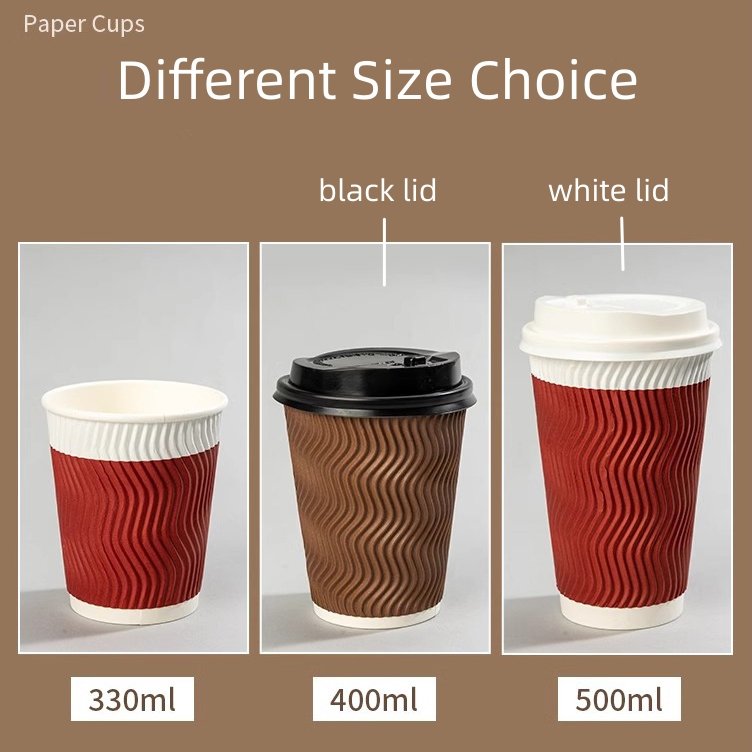99% of Paper Cups Aren’t Recyclable—Certified Biodegradable Options Are
🧃 Introduction: The Hidden Plastic in “Paper” Cups
The morning coffee. The mid-day iced tea. The late-night hot cocoa. Every year, over 250 billion paper cups are used globally, most for just a few minutes before being discarded. These cups might look eco-friendly, but the truth is sobering: 99% of paper cups aren’t recyclable.
Why? Because most paper cups are lined with plastic, typically polyethylene (PE), to prevent leaks. This makes them non-recyclable in standard paper recycling streams. Worse, many cups labeled as “biodegradable” or “eco” fail to break down safely in compost.
But hope isn’t lost. Certified biodegradable paper cups and compostable paper cups are changing the game—offering foodservice businesses a real alternative that’s better for the planet and brand image.
📦 The Core Problem: Paper Cups ≠ Recyclable Cups
According to a 2023 report by the World Packaging Organization, an estimated 2.8 million tons of paper cups are discarded annually—most of which end up in landfills or are incinerated. Why?
Because traditional paper cups are:
-
Lined with polyethylene plastic
-
Bonded materials that are hard to separate
-
Not accepted in 99% of municipal recycling programs
-
Often contaminated with food or drink residue
This means your so-called “paper cup” is just as problematic as a plastic one.
♻️ Biodegradable vs. Compostable vs. Greenwashed
Understanding the difference between compostable paper cups and those that merely claim to be “green” is key.
If a paper cup biodegradable label lacks certification, it’s often misleading.
🧪 Science Behind Compostability
A study published in Waste Management & Research evaluated different paper cups under composting and landfill conditions:
-
Traditional paper cups: Still intact after 180 days
-
PLA-lined “eco” cups: Broke down in 120 days—but only under high-heat compost
-
Certified compostable paper cups (with water-based lining or bagasse):
-
Broke down in under 60 days
-
Left no microplastics or toxic residue
-
Fully accepted in commercial compost facilities
-
This highlights the value of using products from trusted biodegradable paper cups manufacturers—who can provide certified, traceable, and functional solutions.
🏭 Why Foodservice Businesses Must Transition Now
1. 🌱 Regulatory Pressure
Plastic bans and single-use packaging legislation are expanding across the EU, Canada, the U.S., and APAC regions. Non-compliant paper cups with plastic linings may soon face:
-
Fines
-
Retail restrictions
-
Loss of eco-certifications
2. 🌎 Environmental Expectations
Consumers now expect brands to reduce waste, eliminate greenwashing, and be transparent about materials.
A 2022 Nielsen report found that:
73% of Gen Z and Millennials would pay more for certified compostable packaging over traditional paper cups.
3. 📈 Branding & ESG Advantage
Switching to certified compostable paper cups is not just an environmental choice—it’s a marketing one. Brands using sustainable cups can:
-
Display eco-labels
-
Access green packaging grants
-
Achieve zero-waste goals
-
Improve customer loyalty and corporate image
🔍 How to Choose the Right Compostable Cups
✅ Must-Have Features:
-
Certified under EN 13432, ASTM D6400, BPI, or OK Compost
-
Lined with water-based coatings or made from molded fiber
-
Compatible with hot & cold drinks
-
Available in various sizes (e.g., 8oz, 12oz, 16oz, 20oz)
-
Can be custom printed with food-safe inks
🛍️ Recommended Manufacturer: Xiamen Bioleaderpack Co., Ltd.
For brands ready to switch, sourcing from reputable biodegradable paper cups manufacturers is critical.
Why Choose Bioleaderpack:
-
Specializes in certified compostable paper cups with water-based or PLA-free linings
-
Holds certifications: EN 13432, ASTM D6400, BPI, OK Compost
-
Offers full OEM/ODM customization
-
Sizes from espresso cups to large 20oz drink cups
-
High heat resistance (up to 100°C), no warping, no leakage
-
Available for global shipping & bulk export
💼 Real-World Case: A Café Chain’s Sustainable Pivot
A regional coffee chain with 120 outlets across Southeast Asia switched from PE-lined cups to certified biodegradable paper cups from Bioleaderpack.
In 6 months:
-
Reduced packaging waste by 46%
-
Received local government sustainability recognition
-
Boosted customer retention by 19%
-
Added “Compostable Packaging” to menus and signage
-
Saved money on plastic compliance fees
❓Top Google Questions Answered
1. Are paper cups really biodegradable?
Most are not. Only certified biodegradable paper cups without plastic linings will break down properly.
2. Can compostable paper cups go in home compost?
Some can, especially if labeled OK Compost HOME, but most require industrial composting.
3. What’s the difference between biodegradable and compostable paper cups?
Biodegradable means eventual breakdown, with no timeline. Compostable means within 90 days, leaving no toxins, under certified conditions.
4. How can I know if a paper cup is truly compostable?
Check for third-party certifications: EN 13432, ASTM D6400, BPI, or OK Compost. Don’t rely on vague eco-claims.
5. Where can I buy certified biodegradable paper cups in bulk?
Xiamen Bioleaderpack Co., Ltd. supplies globally with full compliance documentation and OEM support.
✅ Final Thoughts: Stop Assuming—Start Certifying
If your brand uses “paper” cups, it’s time to scrutinize the materials, verify certifications, and prioritize compostability over convenience.
The shift from traditional paper cups to biodegradable paper cups isn’t just about sustainability—it’s about staying regulatory-compliant, reputation-safe, and consumer-respected.
Remember:
99% of paper cups can’t be recycled.
But certified compostable paper cups are built for the circular economy.



Comments